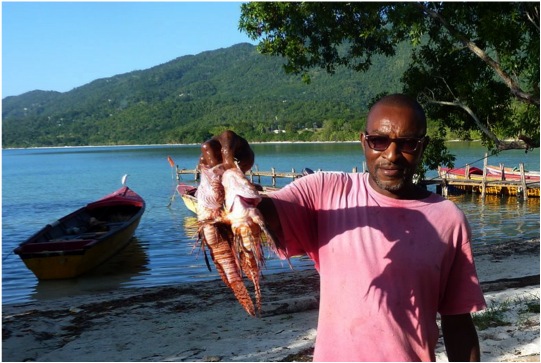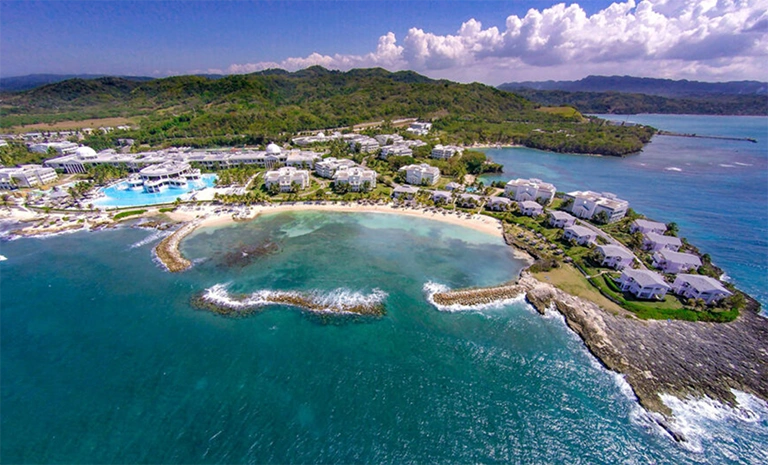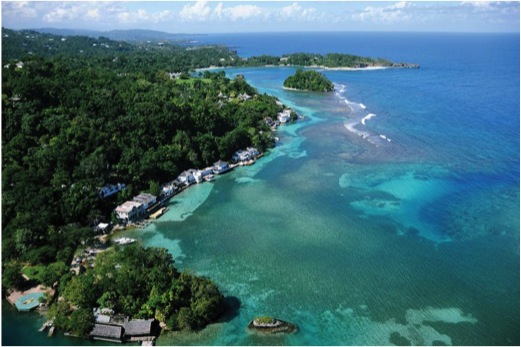Jamaica Tackles its Lionfish Problem

By the Caribbean Journal staff
The invasive Lionfish has spread across the Caribbean – from the Cayman Islands to Grenada.
The continued threat has led to some unusual solutions – like that of renowned Chef Michael Schwartz, whose eponymous restaurant in Grand Cayman has taken a culinary approach to combating the scourge.
Jamaica, too, is tackling the problem, with an unlikely alliance teaming up to do so — US Peace Corps, local fishers, and private Jamaica resorts like Bluefields Bay Villas are working together to see the fish’s reign come to an end.
“The lionfish is an invasive species, not native to the Caribbean. It has no local predators and its population has grown out of control,” said Patrick Marti, a Peace Corps volunteer in Jamaica as part of the Green Initiative Program. “They’re a voracious eater, and they’re having a devastating impact on fish populations.”
That message resonated with Andrew Moncure, general manager of Bluefields Bay Villas, whose Jamaican resort in Bluefields Bay overlooks the largest fish sanctuary in Jamaica.
“We’d seen the fish population decline in the ’80s, and we’d been financial supporters of the Bluefields Bay Fish Sanctuary, so when Patrick (Marti) approached us, we said we’d definitely help out,” Moncure said. “We want the fish population and the eco-system healthy and are naturally concerned about species protection.”
The origin of the fish in the region is still unclear. Marti said that the species could have made its way into the Caribbean when Hurricane Andrew destroyed a seaside aquarium in Florida, draining into the ocean a small population of the fish.
Other theories include larval fish being carried from their native Pacific waters in the ballast tanks of cargo ships and then being released into the tropical Atlantic.
Either way, the lionfish is a long way from its natural home in the Indo-Pacific and is an unwelcome tourist, especially in Jamaica, already recognized as the most over-fished island in the Caribbean.
Marti said lionfish will feast on native baby fish, eating up to 20 per hour, and can lay up to 40,000 eggs a week. Unlike a salmon that spawns once in a lifetime, the lionfish can lay eggs throughout the year. As the lionfish is not part of their natural eco-system, native fish species are also unaware of the menace, so they have no natural instinct to avoid it or be deterred by it.
“Even the grouper, a predator to the lionfish in its natural habitat, is not used to it in the Caribbean – so doesn’t challenge it,” said Marti. “So, we had to develop a strategy to protect the environment and to protect the fish food source on the island.”
Marti said it was important to get local fishers involved in starting to catch the fish. Education was essential – handling the fish can be dangerous because of their beautiful but venomous spines. Once caught, however, the question then became what should be done with the fish, as local populations are not used to seeing it and are therefore not used to eating it.
“We had to work with fishers on how to safely catch and handle the lionfish, but also teach them that it is a delicious fish to eat, so they could be helping the environment, feeding their families, and making some money by selling it,” he said.
Marti enlisted the support of the Bluefields Bay Fisherman’s Friendly Society, as they were already working to help protect the Bluefields Bay Fish Sanctuary. Marti then involved the private sector.
Bluefields Bay Villas had already contributed funding through its own foundation, the Bluefields Environmental Protection Association (BEPA), so they were a natural fit. They also became the first resort in the area, and one of the first resorts in Jamaica, to start serving lionfish.
“As a resort property we use a lot of fish, so we thought we’d definitely give this a shot,” he said.
Moncure said the resort’s chefs were educated on how to handle the fish properly, and from there it became a regular special on the villas’ menu, as at Michael’s Genuine.
The light, white fish, which tastes like a combination of snapper and crab is used in the restaurant’s ceviche, coconut curry and traditional Jamaican brown gravy.
“Patrick has presented a way for us to be part of a sustainable solution to the lionfish problem,” Moncure said.
According to Marti, the word is spreading throughout Jamaica, and to other Jamaica hotels, that lionfish is a safe, delicious fish to eat. Fishers are finding locals, as well as restaurants and resorts, regularly picking up the fish.
“We’ve made a lot of progress in less than two years. Fishers are starting to deliver hand-sliced fillets to markets and restaurants, so that’s great, but we need to continue with an island-wide push to educate people on the safe handling and consumption of lionfish,” he said.
“This invasive species is really wreaking havoc on the overall fish population – the environment here is in danger, but we can make everyone part of the solution. We can and will continue to do something about it.”







